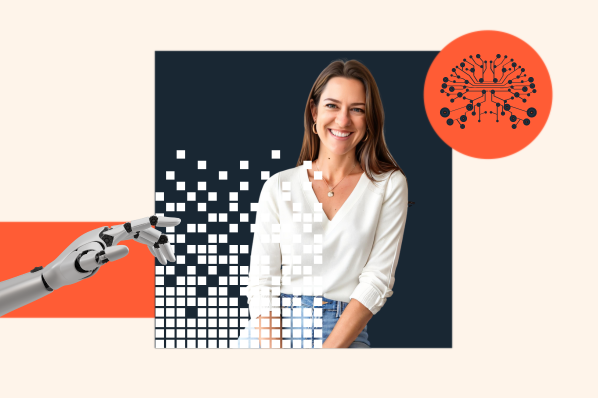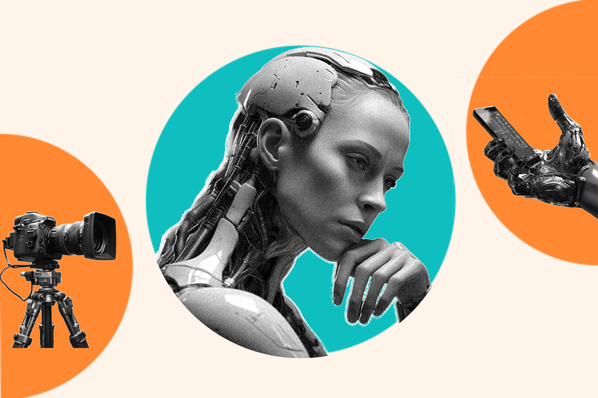It’s been over a year since ChatGPT’s meteoric launch made AI a part of every strategy meeting.

Often with breathless predictions about how AI would kill SEO or usher in its next golden age.
Yet, for all our greatest hopes and fears, we’re still here doing keyword research and ritually chanting, “It depends.”
But keen-eyed marketers will notice that rankings have shifted – sometimes by a lot – and moved strategies (and budgets) with them.
To find out what’s going on, I spoke with one of HubSpot’s own experts to ask how AI has impacted SEO – and what you should be doing about it.
How AI is Impacting SEO
At HubSpot, we’ve had to make some big swings in strategy ourselves, so I reached out to the author of some of those swings: HubSpot’s Manager of EN Blog Strategy, Amanda Sellers.
Let’s jump straight to the big question.
Are recent shifts in SEO due to AI?
“I believe that the ' Helpful Content' algorithm update (and the broader emphasis on EEAT) is in direct response to AI content creation,” says Sellers.
If you’re unfamiliar, she’s talking about a massive update Google made in late 2022 to the algorithm that chooses its search rankings.
That kicked off a long series of additional updates across 2023 that aimed to promote content that met Google’s guidelines for quality: Experience, Expertise, Authority, and Trustworthiness (or EEAT).

The goal of EEAT is simple: To make sure that content made for humans shows up in the search results – instead of content made to please search engines.
“In theory, generative AI becoming accessible for content creators and website owners means an opening of the floodgates for more content proliferation.”
But more content doesn’t necessarily mean better content.
“Generative AI is very good at providing evergreen, objective information (and regurgitating stances that already exist),” Sellers explains. “It’s less good at providing opinion, differentiated stances, or first-party research.”
And those are the qualities that are winning in the search rankings right now.
Qualities that tend to come from experience.
“Generative AI cannot fulfill those requirements because it is not alive and cannot experience things,” she adds. “Coincidence? I don’t really think so.”
So we’re seeing changes in response to AI, but what about changes driven by AI?
Is AI-powered search changing SEO?
In Feb. 2023, Microsoft beat Google to the race by adding an AI chatbot straight into its search product.
In response, Google rushed to announce its own AI-powered Search Generative Experience (SGE). But at the end of 2023, Google quietly pushed back the release of SGE.
So what happened?
“For starters, the threat to their market share from Bing’s AI search did not actualize,” says Sellers.
As of early 2024, Google still controls 91.47% of the global search market, falling only 1.5 percentage points last year.
“Second, SGE puts Google’s ad revenue at risk,” she adds.
According to the SEC, that topped $237 Billion US in 2023, and it relies on your eyes staying on Google.
“And last, there are a number of infrastructural challenges that warrant moving cautiously.”
The most notable challenge? LLMs actually make really bad search engines.
Consider how often Google has to update its indexes in order to include all of the new pages, videos, and social media posts created every day.
An LLM could only include those by adding them to its training data set – and then retraining the entire model.
But that brings us to our next question: If LLMs haven’t made a big change to search tools, have they changed search behavior?
Has AI caused changes in search behavior yet?
One of the early concerns about AI was that searchers would turn to ChatGPT for answers instead of Google.
In December, Gartner caused panic by predicting a 25% drop in search volume by 2026 due to LLM use.
Could some of the traffic losses be users leaving Google altogether?
“Changes in search behavior are difficult to quantify,” Sellers cautions. “Especially since these kinds of macro behavioral changes are slow and widespread.”
“I am starting to see demand loss on some queries where I suspect ChatGPT could probably be more helpful than a blog post,” she says. “But with all the volatility in 2023, it’s hard to say if AI adoption is the main cause of the loss.”
So, while it is possible, it’s definitely not happening enough to be noticeable.
It’s also worth remembering that the type of search that can be satisfied by ChatGPT would likely be a zero-click search anyway.
In other words, the user would have gotten the answer straight from the search results without clicking on your site.
Which makes a lovely segue to the question of how SEO fits into a larger marketing strategy.
A question that existed before AI jumped in to complicate things.

Does AI shift the balance of organic vs. non-organic marketing strategies?
“It’s never good practice to put all your eggs in one basket, however powerful that basket is,” Sellers says. “This is an opinion I held before widespread AI adoption, and it’s an opinion I’ll continue to hold.”
(For SEOs, this is an opinion often learned after getting burned by an algorithm update.)
“Google is [still] a powerful channel for blogs because organic search (the behavior) is ongoing and repeatable — which makes it very easy to scale and get performance.”
That’s in contrast to channels like email, paid ads, or social media, which require constant attention (or constant budget).
But is AI changing the power of those baskets?
“I think that the effectiveness of Google as a channel is decreasing,” admits Sellers. “But the funny thing is… it’s been continually decreasing for my entire career as a content SEO.”
She runs through a rollercoaster of challenges any long-time SEO will recognize.
“The introduction of featured snippets, increasing the real estate for Google Ads, the introduction of images and video on the [results page], the rise of zero-click searches … have all reduced the effectiveness of the channel.”

“Remember when SERPs looked like this? (Or did I just date myself?)”
But long-time SEOs will also recognize that each of those challenges presented its own opportunity, too.
“We adapt and make new strategies in the wake of those things and still see an incredible volume of demand from search as a result,” Sellers says. “The same will happen through the AI boom.”
So how can SEOs adapt?
How Marketers can Adapt SEO to AI
Before letting her go, I pestered Amanda for advice on your behalf. (See how much I love you?)
Here are her top 3 takeaways for marketers looking to adapt SEO to AI:
1. Lean into opinionated content with original thinking or original data.
“When deciding what content to create, it’s not enough to produce evergreen, factual content anymore because ChatGPT can do that,” Sellers suggests. “Think about positioning and the unique things your publication can offer that can’t be found elsewhere.”
That could mean the input of an expert in your field, industry data your company already collects, or even just a fun tone readers come back for.
Since it’s unique to your company, you’ll have to figure that part out.
2. Contextualize through a human lens.
“When creating content, use AI as a tool but understand its limitations,” she says. Then she doubles down.
“Actually, don’t just understand them — curb them with your unique human perspective.”
That unique perspective is what will set you apart from everyone using ChatGPT to write the same article.
3. Create content for humans.
Whether you’re writing a blog, a newsletter, or a product landing page, always return to the value you’re offering your readers.
It’s here that Amanda drops the moral of the story:
“It’s not search engines that are reading your content; it’s other humans.”



![I Ran 100s of Queries to Find Out If AI Chatbots are Better Than Search Engines [Experiment]](https://www.hubspot.com/hubfs/I%20Ran%20100s%20of%20Queries%20to%20Find%20Out%20If%20AI%20Chatbots%20are%20Better%20Than%20Search%20Engines.png)




![Real or AI-Generated? You Guess [Quiz]](https://www.hubspot.com/hubfs/Real%20or%20AI-Generated.png)


